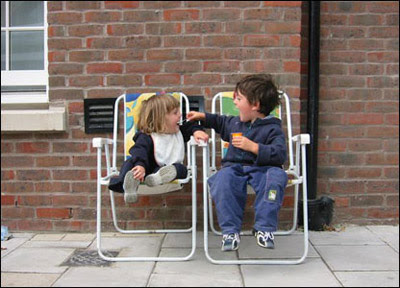
You can start taking care of your child's eyesight from a very early age.
At what age can a child have an eye examination?
Children are screened for eye problems within a few weeks of birth, and then either shortly before or soon after they start school at the age of four. If you have any concerns in between these tests, or if there are members of your family with eye problems, you can talk to your doctor or have your child's sight tested by a local optometrist or eye doctor.
Remember - the earlier a problem is found, the more effectively it can be treated.
How long should a sight test take?
This can vary. Healthy children will take about 20 to 30 minutes to test. If the child needs to have eye drops put into their eyes (to make the pupils bigger and easier to test) then you should allow longer as the drops need to take effect.
Will it be the same as an adult eye test?
Older children are usually tested in the same way as adults. For younger children and older children for whom adult tests are not appropriate, there are special tests.
Are children's eye tests free?
Children under 16, and full time students under the age of 19, are entitled to free eye tests on the NHS.
What if my child needs glasses?
Children who have been tested on the NHS will get a voucher to help towards the cost of glasses. Children can choose from a wide variety of frames, which are practical as well as fashionable. Plastic lenses are recommended for children, which are lighter and safer than glass.

What happens if a child breaks or loses their glasses?
Children under the age of 16 are automatically covered for loss or damage of their glasses on the NHS. You can go to any optician who does NHS eye tests and get a repair or replacement form (GOS 4). You will be asked to make a statement about what happened, and the optician will give you a voucher to help with the cost. If you go to a different optician from the one who provided the glasses in the first place, you will need to take a copy of the original spectacle prescription with you.
Children aged 16 and over are only entitled to help if the loss or damage of their glasses was caused by a disability. Your optician can tell you how get help.
Can children wear contact lenses?
Children can be fitted with contact lenses and your optometrist will be able to advise you. It is the child's decision whether or not to wear contact lenses, and they will only be provided if the child wants them. Children must also be able to put the lenses in and out themselves, and understand fully the need to look after them properly.






